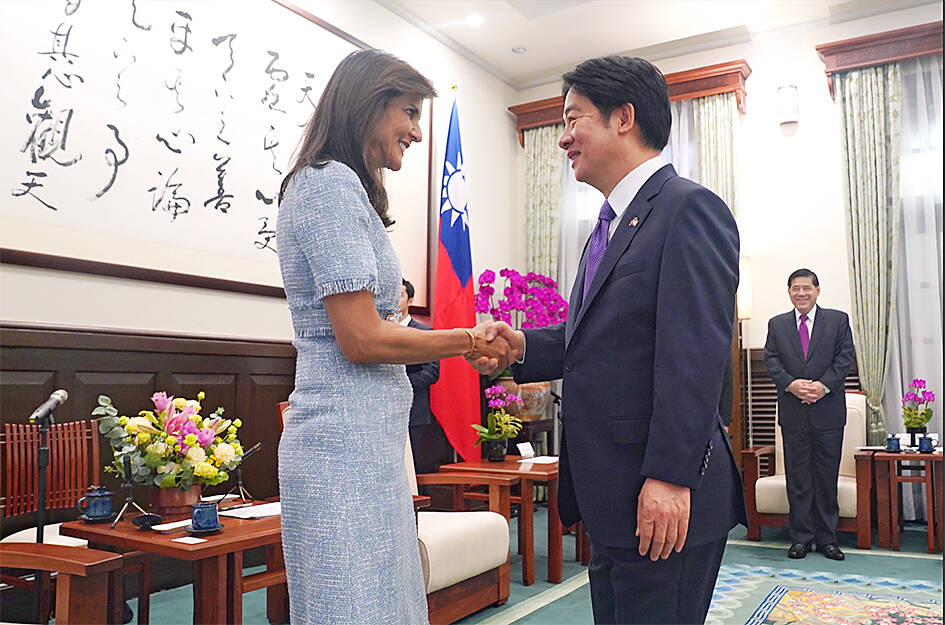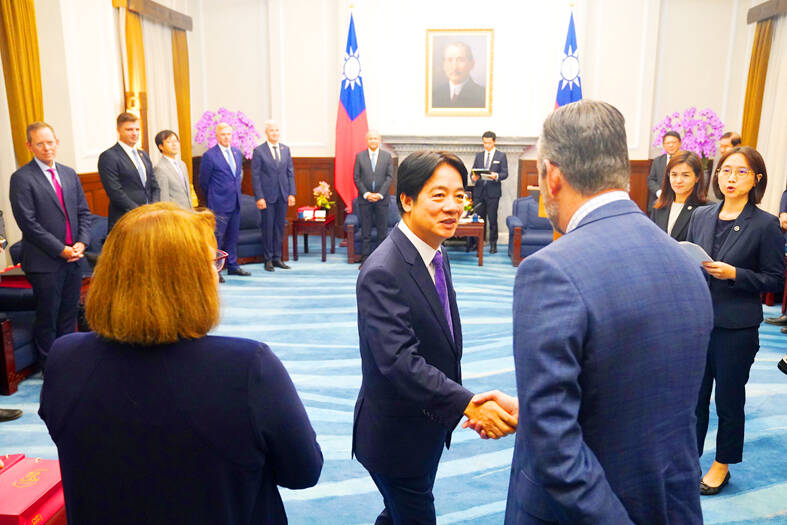President William Lai (賴清德) yesterday met with participants of the Ketagalan Forum, saying he hoped to cooperate with democratic partners to safeguard shared values and address challenges posed by authoritarianism.
The Ketagalan Forum was held on Wednesday in Taipei and was attended by politicians and experts from 11 nations.
It explored the cross-strait situation and global security order, as well as how “gray zone” tactics have impacted and challenged democracy, Lai said in his address to the guests at the Presidential Office in Taipei yesterday.

Photo: CNA
Lai thanked them for demonstrating the strength and determination to safeguard democracy by traveling from around the world to attend the forum.
Taiwan has been promoting the Taiwan-Europe Connectivity Initiative and New Southbound Policy to deepen economic and trade connections with partner countries, while also working with the US, Japan and Australia to expand the Global Cooperation and Training Framework (GCTF), he said.
“We are happy to announce Canada as GCTF’s full partner starting from this month and would enhance our cooperation on various global issues in the future,” Lai said.

Photo: CNA
Democratic partners must work together in solidarity to form industrial structures and supply chains that are resilient against the threats of authoritarian expansion, he said.
Center for Research on Strategic and Security Issues convener Pankaj Saran congratulated Lai on his election victory, saying that it attests to the will of Taiwanese in maintaining democracy.
Taiwan is a leader in global technology and production, and has been a deeply trusted supply chain partner, he said, praising Taiwan for transitioning from an “island of silicon” to an “island of artificial intelligence.”
Saran also said the New Southbound Policy has established cooperation with new partners and economies, and reduced the nation’s reliance on particular markets.
Separately, Lai met with a delegation led by former US ambassador to the UN Nikki Haley at the Presidential Office, who also attended the forum and gave a keynote speech on her first-ever visit to Taiwan.
Lai thanked Haley for appealing to the international community to embrace Taiwan against authoritarian threats posed by China.
“Ambassador Haley spoke up for Taiwan during her term as ambassador to the UN” and when Taiwanese are not allowed into the UN headquarters, she supported Taiwan by asserting that “the UN belongs to the world, and people of any country should have the right to enter the UN headquarters and work there,” he said.
In terms of economic issues, Lai said he is grateful that Haley had urged the US government to sign a free-trade agreement with Taiwan to prevent the nation from being isolated by China.
“And when I look at what we need with moral clarity, there’s nothing more stark than the differences between Taiwan and China,” she said.
While Taiwan is made up of “a courageous group of people that understand the importance of freedom and understand the importance of democracy,” China emphasizes “control and suppression,” she said.
The differences between Taiwan and China were particularly apparent during COVID-19, Haley said.
“That was in stark contrast to the lack of moral clarity by China, who hid the idea that the virus came from China, who didn’t tell the rest of the world the warnings that were happening, and who allowed millions of people to die because of their arrogance,” she said.
In contrast, despite being isolated from the world due to Chinese pressure, Taiwan tried to warn the WHO about the virus, Haley said.

An essay competition jointly organized by a local writing society and a publisher affiliated with the Chinese Communist Party (CCP) might have contravened the Act Governing Relations Between the People of the Taiwan Area and the Mainland Area (臺灣地區與大陸地區人民關係條例), the Mainland Affairs Council (MAC) said on Thursday. “In this case, the partner organization is clearly an agency under the CCP’s Fujian Provincial Committee,” MAC Deputy Minister and spokesperson Liang Wen-chieh (梁文傑) said at a news briefing in Taipei. “It also involves bringing Taiwanese students to China with all-expenses-paid arrangements to attend award ceremonies and camps,” Liang said. Those two “characteristics” are typically sufficient

A magnitude 5.9 earthquake that struck about 33km off the coast of Hualien City was the "main shock" in a series of quakes in the area, with aftershocks expected over the next three days, the Central Weather Administration (CWA) said yesterday. Prior to the magnitude 5.9 quake shaking most of Taiwan at 6:53pm yesterday, six other earthquakes stronger than a magnitude of 4, starting with a magnitude 5.5 quake at 6:09pm, occurred in the area. CWA Seismological Center Director Wu Chien-fu (吳健富) confirmed that the quakes were all part of the same series and that the magnitude 5.5 temblor was

The brilliant blue waters, thick foliage and bucolic atmosphere on this seemingly idyllic archipelago deep in the Pacific Ocean belie the key role it now plays in a titanic geopolitical struggle. Palau is again on the front line as China, and the US and its allies prepare their forces in an intensifying contest for control over the Asia-Pacific region. The democratic nation of just 17,000 people hosts US-controlled airstrips and soon-to-be-completed radar installations that the US military describes as “critical” to monitoring vast swathes of water and airspace. It is also a key piece of the second island chain, a string of

The Central Weather Administration has issued a heat alert for southeastern Taiwan, warning of temperatures as high as 36°C today, while alerting some coastal areas of strong winds later in the day. Kaohsiung’s Neimen District (內門) and Pingtung County’s Neipu Township (內埔) are under an orange heat alert, which warns of temperatures as high as 36°C for three consecutive days, the CWA said, citing southwest winds. The heat would also extend to Tainan’s Nansi (楠西) and Yujing (玉井) districts, as well as Pingtung’s Gaoshu (高樹), Yanpu (鹽埔) and Majia (瑪家) townships, it said, forecasting highs of up to 36°C in those areas